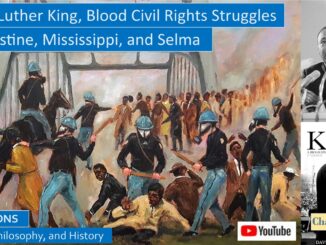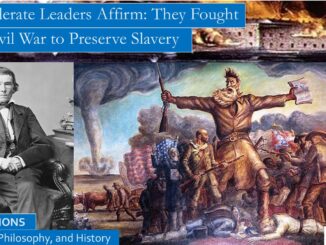
Martin Luther King, Bloody Struggles in Mississippi and Selma, Lewis’ Biography Chapters 8-9
After the Selma march, Martin Luther King delivered another rousing speech. “They told us we wouldn’t get here. And there were those who said we would only get her over their dead bodies, but all the world together knows that we are here and that we are standing” in “Alabama saying, ‘Ain’t goin’ let nobody turn us around.’” “Our whole campaign in Alabama has been centered around the right to vote.” “The threat of the free exercise of the ballot by the Negro and white masses alike resulted in establishing a segregated society. They segregated Southern money from the poor whites; they segregated Southern churches from Christianity; they segregated Southern minds from honest thinking, and they segregated the Negro from everything.” […]

